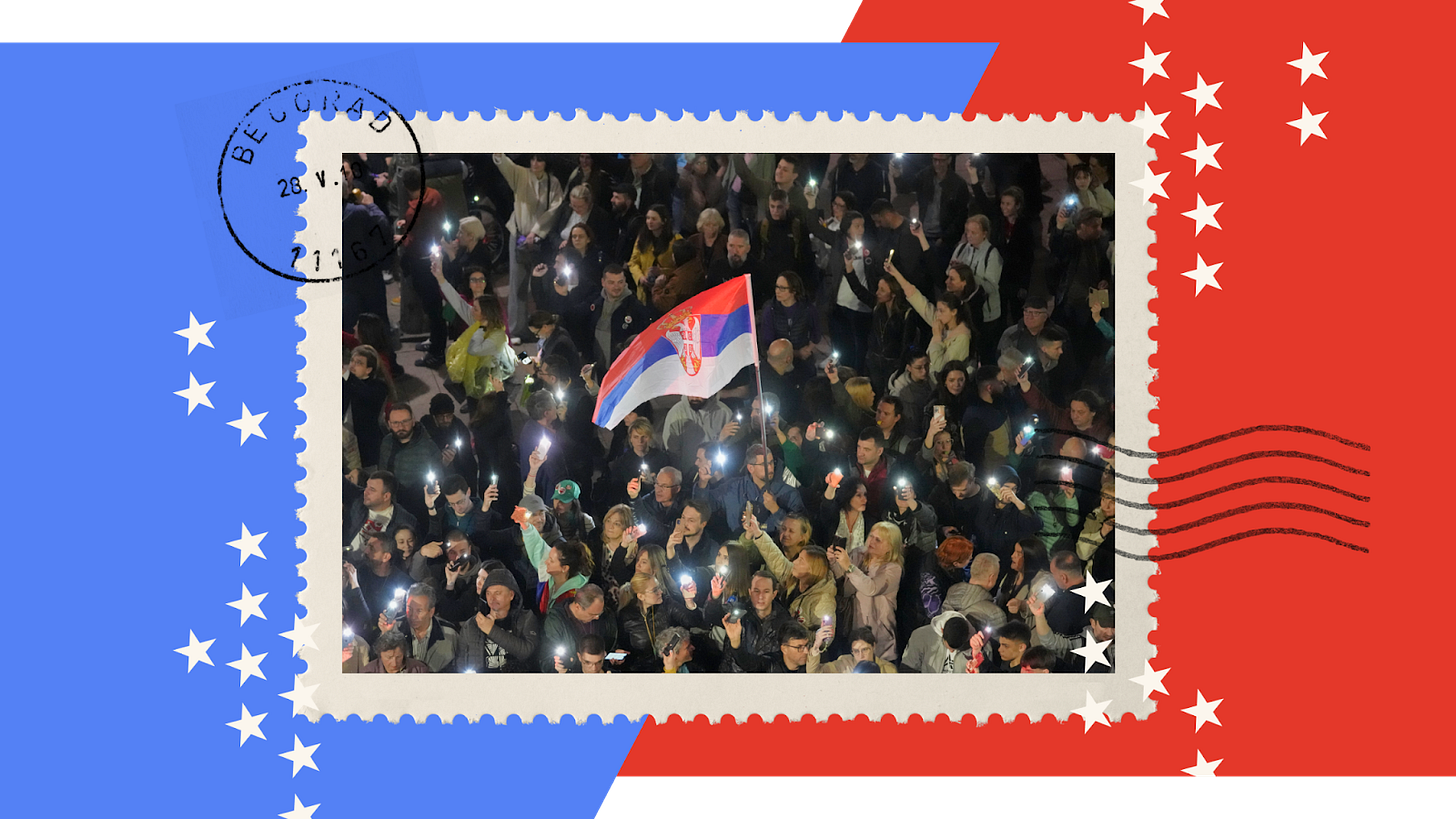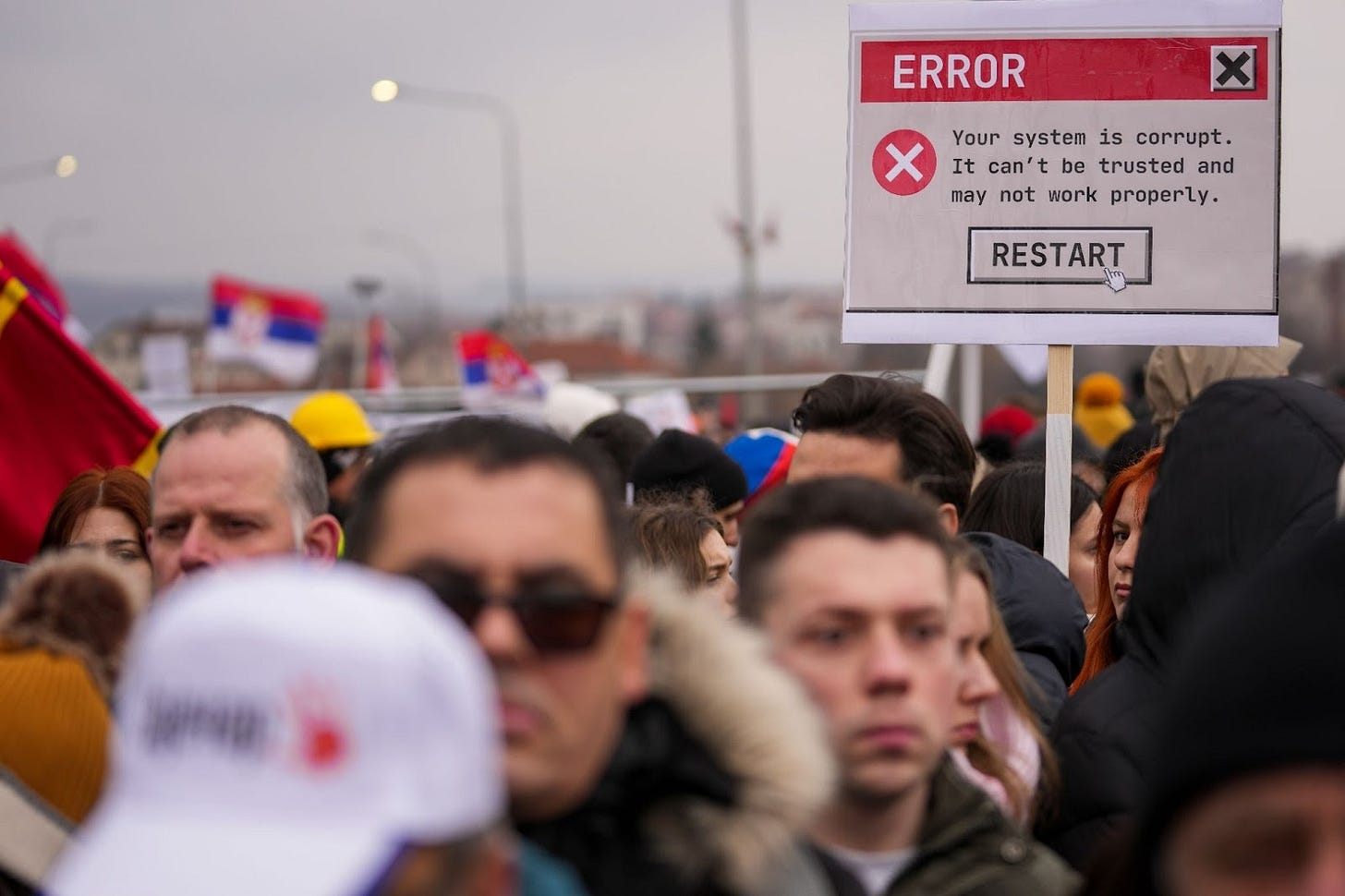Democracy Atlas rule 7: Leave the door open for defectors
Serbia shows how backlash to corruption can swell pro-democracy movements

Rule 7: Leave the door open for defectors: Even though an autocratic leader might initially win power through a democratic election, that does not mean they will maintain a positive approval rating forever. Because authoritarian systems often fail to deliver material benefits and positive results for their citizens, it’s only a matter of time before even some supporters defect. Create a soft landing for those who leave the autocratic faction without playing the “blame game.” Give them space to discreetly share their experiences. Welcome anyone who opposes the autocrat — including voters who put the autocrat in office — and help them find a role to play in the pro-democracy coalition.
Remember that it’s possible for two sides to diagnose the same problem while disagreeing on the remedy. It’s worth bringing newcomers into the fold — even if you don’t agree on everything — if it means voting democracy back into office.
Nearly a year ago, the roof collapsed at a train station in the Serbian city of Novi Sad. Over a dozen people died.
The tragedy sparked a massive protest movement against the corruption and impunity of the country’s autocratic government — and its personalist leader, President Aleksandar Vučić. In the months since, people from all walks of life have joined the demonstrations, energized by the promise of restoring a more democratic Serbia.
A week before the events in Novi Sad, I happened to be in Serbia for conversations with pro-democracy advocates and scholars on the heightened threat of competitive authoritarianism in the region (and around the world).
In Belgrade, I heard from folks concerned with the rise of would-be autocrats who use the trappings of democratic institutions (like elections) to provide a veil of legitimacy as they consolidate power. Modern-day autocrats, from Putin to Orbán, have used this playbook to entrench their rule — and they’ve successfully exported it to their autocratic counterparts, including Vučić.
For years, Serbia’s pro-democracy forces had been concerned about creeping authoritarianism under Vučić. Though he initially won power on a reform agenda, his tenure has been defined by a deterioration of the rule of law and proliferation of corruption. And, although his authoritarian impulses have been challenged at various points over the past decade, nothing quite compares to the demonstrations of the past year, which have been among the largest in Serbian history.
Despite increased state crackdowns, those opposed to Vučić’s autocratic rule have managed to broaden their tent by bringing in support from unlikely corners of Serbian society — bolstering their calls for pro-democracy change and reform.
Vučić has used Serbia’s legal system to undermine the political opposition
Since 2012, Serbia’s democracy has steadily eroded under Vučić and his personalist Serbian Progressive Party (SNS). After winning parliamentary and presidential elections that year, Vučić and SNS quickly began consolidating power.
Starting as deputy prime minister, then prime minister, and now as president, Vučić has spun a web across Serbia’s political and media ecosystem, making it difficult for an effective pro-democracy coalition to challenge his rule.
Even before Vučić’s rise, Serbia’s democracy was fragile. After a successful anti-authoritarian movement ousted strongman Slobodan Milošević at the ballot box in 2000, many hoped that democracy would deliver a stronger, more prosperous Serbia in the 21st century. But by the mid-2000s, disillusionment with the country’s political elites (and democracy itself) began to grow.
Then in came Vučić — formerly one of Milošević’s spin doctors — who took advantage of that disillusionment and promised a fresh start with SNS at the helm.
Four years after SNS’s 2012 victory, Vučić had already centralized control over much of Serbia’s politics and media. And by the time he called early snap elections in 2016, it was clear he had no intention of playing fair in order to win. As expected, regional watchdogs found that the elections were held under “unclear rules” and flagged the misuse of state resources by the SNS campaign.
By tilting the electoral playing field, the ruling party held on to its parliamentary majority, giving Vučić the go-ahead to continue his various power grabs.
As the 2017 election approached, Vučić set his sights on the presidency. Throughout the campaign, SNS dominated the public narrative and shut out opposition voices from a fair contest. And on election day, observers reported instances of voter intimidation and pressure on public sector employees to support Vučić at the polls. Still, following his election as president, Vučić claimed a popular mandate to remake the state in his image.
Public outrage grew as Vučić ascended to the presidency, culminating in the weeks-long “Protest Against Dictatorship.” But Vučić rallied his supporters and media allies to dismiss the opposition’s claims of democratic backsliding under his watch. For the new president, delegitimizing any and all sources of opposition became a top priority.
Vučić and his allies orchestrated smear campaigns against potential rivals and civil society groups, flooded the airwaves with pro-government propaganda, and changed electoral rules to stamp out any viable challengers. Since 2017, SNS has routinely manipulated electoral laws to weaken the already fractured opposition.
Like many modern-day autocrats, Vučić craves the illusion of democratic legitimacy. And he works tirelessly to engineer results that shroud the existence of any hint of dissent.
The opposition struggled to harness the energy of mass mobilization
Despite his attempts to stamp out dissent, public mobilization against Vučić’s boundless rule of law violations has continued. In 2018, the “One of Five Million” movement grew into a broader show of dissatisfaction.
The movement’s anti-authoritarian message resonated with elites, but its singular focus on democracy failed to win over large swaths of the public — especially those who had previously supported the ruling party or checked out of politics altogether.
A failed boycott of the 2020 parliamentary election only deepened the public’s disillusionment with democracy, as the opposition was unable to retake the narrative from the ruling party. Voter turnout didn’t drop as much as the opposition anticipated, and SNS emerged even stronger.
By 2023, Vučić had tightened his grip on power. In the snap parliamentary election that year, the political opposition couldn’t keep up with the ruling party’s electoral chicanery. Election monitors reported widespread fraud and a contest dominated by pro-government media coverage. Unsurprisingly, SNS again held its parliamentary majority.
Though the ruling party’s dirty tricks were nothing new, the 2023 election was a “game changer” for Serbian democrats. The unprecedented scale of electoral manipulation was a wake-up call for many in Serbia’s pro-democracy coalition: Vučić and SNS had no plans to relinquish power.
Following the contested election results, demonstrations against the ruling party spread. And a renewed movement toward greater government accountability was brewing just under the surface.
Corruption sparked a new wave of pro-democracy mobilization
After the tragic roof collapse at the Novi Sad train station left 16 dead, a new wave of anti-government protests erupted late last year. Demonstrations calling for greater government transparency quickly grew into a nationwide movement fueled by long-standing anger over Vučić’s disregard for the rule of law and his corrupt, autocratic governance.
Following the roof collapse, government officials shifted blame in all directions, while the engineers working on the station pointed to rushed timelines and shoddy oversight by those managing the project. Meanwhile, Vučić and his allies initially denied any involvement altogether. But his cagey response to questions about the collapse deepened public outrage and followed his strategy of muddying the waters when backed into a corner.
Within days, a student-led protest movement emerged.
For much of Vučić’s tenure, young people were among Serbia’s least politically engaged due to widespread disillusionment. But now they led the charge, rallying under the message: “Corruption Kills.” The clear anti-corruption message resonated across generational lines and initially left SNS flat-footed in its response.
Early on, the demonstrators distanced themselves from formal opposition parties, creating space for those fed up with the entire system (including SNS supporters). And organizers have made it a point to reach those in the ruling party’s rural strongholds. Over the past eleven months, protesters have drawn links between SNS’s endemic corruption and its decade-long assault on democratic institutions and the rule of law. And unlike earlier waves of mobilization that only reached a certain segment of the public, this movement has cast a wider net by focusing on issues with which there is widespread agreement.

Vučić and his cronies are betting that traditional SNS supporters will hold the line. But over the past several months, pensioners, farmers, veterans, state employees, and even judges have joined the hundreds of thousands rallying against corruption and advocating for a stronger democracy. Those who had been checked out of politics for years have now joined in supporting the protests. Even the state-dominated media has been forced to cover the demonstrations (much to Vučić’s dismay), reaching viewers who usually only hear the government’s talking points.
According to recent surveys, support for the demonstrations remains strong. Despite increased intimidation by the government (and brazen attempts to buy the support of young people), the protests have remained focused and inclusive, leaving the door open to all who want to restore and repair Serbia’s democracy.
Though the movement notched several early wins, including the release of classified documents related to the roof collapse and the prime minister’s resignation, the regime has responded with renewed hostility. As Vučić flounders, he’s taken a page out of the authoritarian playbook by casting his growing number of critics as “foreign” agents and extremists.
As one analyst put it: “[T]here is now an articulated bloc made up of students, citizens, the opposition and civil society — which is now relatively equal to the ruling bloc and capable of competing with them in elections.”
In recent months, thousands have continued to mobilize for democratic renewal, with mounting calls for early elections to challenge the autocratic government. Polling shows growing support for an anti-Vučić bloc amid an environment of heightened polarization. But it remains to be seen whether Vučić risks calling an election that he could lose outright, even with the backing of the state apparatus.
But over the past several months, pensioners, farmers, veterans, state employees, and even judges have joined the hundreds of thousands rallying against corruption and advocating for a stronger democracy.
Up until this point, Serbia’s pro-democracy leaders have struggled to bring in defectors and the politically disengaged. And while the current protest movement remains strategically removed from the existing political opposition, it might be wise for opposition leaders to acknowledge how their failures helped facilitate Vučić’s rise. This kind of self-reflection would welcome newcomers to the fold and help rebuild trust with those who’ve tuned out of politics since Vučić’s takeover.
Despite increased domestic repression and Vučić’s continued cozying up to autocrats abroad, this pro-democracy movement’s inclusive approach has opened the door for greater public participation — and exposed Vučić as a weak strongman.




Thank you for sharing an international perspective, and one that we can learn from. Having worked on democracy programs around the world, I can tell you the authoritarian playbook is painfully similar everywhere. Autocrats capture the media, twist the rules, smear opponents, and then deny responsibility for anything they've done wrong, even when its obvious. Furthermore, they nurture pessimism so that the population does nothing about the situation. The U.S. isn’t exceptional in terms of how autocrats follow an almost scripted set of moves. So the Serbian lesson you've shared, to “leave the door open for defectors,” really matters here in the USA too.
If you replaced 'Serbia' with 'USA' and 'Vučić' with 'Trump', you wouldn't have to change much.